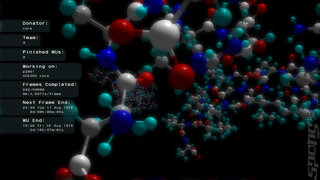PlayStation 3 To Cure Cancer or Alzheimer’s
Prestigious university declares the PS3 ‘sick’… but in a good way.

Using the PS3's Cell processor to live up to its name.
California’s world-renowned Stanford University is asking PS3 owners to help contribute to its Folding project, which is seeking cures for some of the world’s nastiest diseases including Alzheimer’s, Huntington's, and certain forms of cancer.
The work uses software called - helpfully - Cure, a version of which is being made available by Sony. It operates in a similar way to the SETI@Home project run out of Berkley – in that users download software that enables their computers to use their ‘downtime’ to act as remote processing power to analyse data.
The aim of the Folding project is to understand protein folding, misfolding, and related diseases. According to the project website:
The project uses the PS3's Cell processor which the Stanford project team hopes will, “…be able to attain performance on the 100 gigaflop scale per computer. With about 10,000 such machines, we would be able to achieve performance on the petaflop scale.
"The PS3 client will also support some advanced visualization features. While the Cell microprocessor does most of the calculation processing of the simulation, the graphic chip of the Playstation 3 system (the RSX) displays the actual folding process in real-time using new technologies such as HDR and ISO surface rendering. It is possible to navigate the 3D space of the molecule using the interactive controller of the PS3, allowing us to look at the protein from different angles in real-time.”
Head over to the Folding@Home PS3 FAQ to find out how to get involved.
The work uses software called - helpfully - Cure, a version of which is being made available by Sony. It operates in a similar way to the SETI@Home project run out of Berkley – in that users download software that enables their computers to use their ‘downtime’ to act as remote processing power to analyse data.
The aim of the Folding project is to understand protein folding, misfolding, and related diseases. According to the project website:
Proteins are biology's workhorses -- its "nanomachines." Before proteins can carry out these important functions, they assemble themselves, or "fold." The process of protein folding, while critical and fundamental to virtually all of biology, in many ways remains a mystery.
The project uses the PS3's Cell processor which the Stanford project team hopes will, “…be able to attain performance on the 100 gigaflop scale per computer. With about 10,000 such machines, we would be able to achieve performance on the petaflop scale.
"The PS3 client will also support some advanced visualization features. While the Cell microprocessor does most of the calculation processing of the simulation, the graphic chip of the Playstation 3 system (the RSX) displays the actual folding process in real-time using new technologies such as HDR and ISO surface rendering. It is possible to navigate the 3D space of the molecule using the interactive controller of the PS3, allowing us to look at the protein from different angles in real-time.”
Head over to the Folding@Home PS3 FAQ to find out how to get involved.
Read More Like This
Comments
This is a great idea. I mean, now we're all on broadband, and millions of us will have a super-computer sat around doing nothing for most of the time - might as well find a cure death so we can all be around to see the world burn itself to a crisp.
Maybe good to split time between the two projects, in the hope that when we do find aliens, they might feel predisposed to save us from our own stupidity.
Maybe good to split time between the two projects, in the hope that when we do find aliens, they might feel predisposed to save us from our own stupidity.
at the rate were going, we will all be around to watch ourselves burn each other to a crisp via the medium of nuclear warfare
it is a good idea though, and id jump on it if i had a blu-ray player.
it is a good idea though, and id jump on it if i had a blu-ray player.
more comments below our sponsor's message
Good idea... at least for the 0.000001% of people who's ISP don't cap their downloads to xGB per month ;)
kid_77 wrote:
Good idea... at least for the 0.000001% of people who's ISP don't cap their downloads to xGB per month ;)
My 10Meg connection is unlimited. You need a better ISP, mate!
But this project does not involve loads of download. You get a (fairly modest sized) chunk of data then spend ages processing it, then spit back a (fairly modest sized) result, and get another chunk of data.
Not that much data transfer at all.
Haha, nah mine's fine: 8Mb d/l, 0.5Mb u/l and unlimited (well, never noticed any throttling)
T'was more of a sideswipe at most funting ISPs. Had lots of mates moaning about their ISPs suddenly slapping restrictions of some sort or another.
T'was more of a sideswipe at most funting ISPs. Had lots of mates moaning about their ISPs suddenly slapping restrictions of some sort or another.
kid_77 wrote:
T'was more of a sideswipe at most funting ISPs. Had lots of mates moaning about their ISPs suddenly slapping restrictions of some sort or another.
Mine was restricted when I took the service but they de-restricted it, saying the limit was so high that so few people broke it there was no point keeping it.
I'm not saying they are any better than other ISPs, but they aren't as bad as them.
It's a good idea, but there is going to be much gnashing of teeth if a permanently maxed out Cell processor goes POP from the overwork. That cooling ain't so great and I certainly wouldn't leave mine (if I bought overpriced Sony products in the first place) burning itself into an early grave 24/7.
